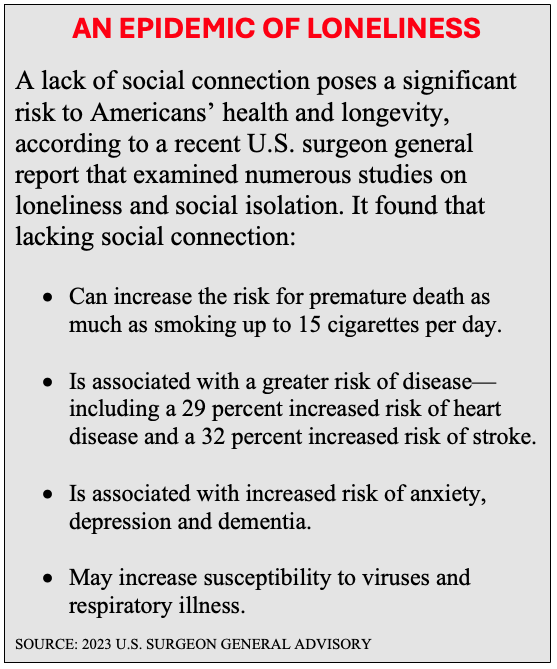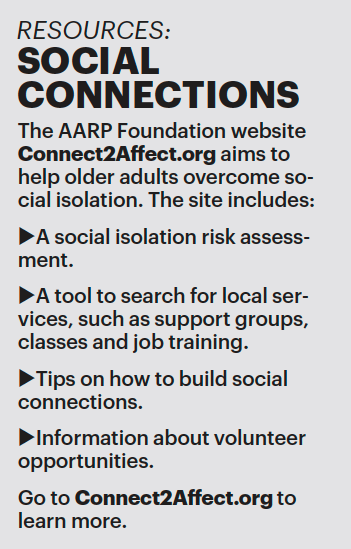Helping to Foster Social Bonds in Massachusetts
At 81, Fran Jewers-Langille doesn’t ordinarily go out to bars. But when her son and grandson’s rock band plays near her Worcester home, she heads over to see them.
Jewers-Langille, a retired administrative assistant, enjoys the intergenerational, family-oriented atmosphere of music at the brewery, especially in the summertime.
“People are there with their dogs; they’re there with their kids,” she says. “It’s just such a community spirit.”
As an AARP volunteer, Jewers- Langille is now helping to organize an AARP on Tap event at a local brewery, bringing members together to enjoy a pint and conversation. It’s one of a series of activities AARP Massachusetts is planning this year in an effort to combat loneliness and social isolation.
“It really is a push, post-pandemic, to get out in the community and make those face-to-face connections,” says Polly Hunt Mendoza, AARP Massachusetts community and volunteer engagement director.
Other upcoming events include a visit to the New England Botanic Garden at Tower Hill in Boylston, a WNBA game, ice cream socials, a zoo trip, and outings to the Cambridge Jazz Festival and Worcester’s Latin American Festival.
AARP Massachusetts also hosts monthly Walk With a Doc gatherings in Boston and in Worcester, where members can walk and socialize together, as well as hear from a local health care provider.
A health crisis
Creating these opportunities for social connection is about more than just fun.

A 2023 advisory from the U.S. surgeon general declared increasing loneliness, isolation and lack of connection to be a public health crisis.
Research shows that the physical health consequences of disconnection include a 29 percent increased risk of heart disease, a 32 percent greater risk of stroke, and a 50 percent increased risk of developing dementia for older adults, according to the advisory.
It also notes that a lack of social connection increases the risk of premature death by more than 60 percent—to levels comparable to the risk of daily smoking.
“We must prioritize building social connection the same way we have prioritized other critical public health issues such as tobacco, obesity and substance use disorders,” the surgeon general’s office urges.
Non-family ties
Sandra Harris, AARP Massachusetts volunteer state president, has made building social connections a central focus since she took office in 2019 and began receiving calls from community advocates who were concerned about the issue.
In response, AARP brought together dozens of organizations to create the Massachusetts Coalition to Build Community and End Loneliness, which Harris coleads.
The COVID-19 pandemic put a spotlight on the problem of loneliness.
“For the first time ... everybody knew what it meant to be lonely and socially isolated,” Harris says.
But research shows loneliness has been a problem for some time, she notes.

Before the pandemic, about half of U.S. adults reported experiencing measurable levels of loneliness, according to the surgeon general.
Alyssa Goldman, an assistant professor of sociology at Boston College, says social ties are important at all stages of life, but those connections are especially key later on, when older adults experience life transitions and health challenges.
A study she coauthored found adults 65 and older reported significantly lower levels of fatigue and stress when they were with friends and neighbors.
With families being smaller than in the past and people living farther from their adult children, nonfamily ties are an important source of social connection, Goldman says.
Harris says she is always urging people to talk to their health providers about loneliness. People think about mental and physical health, their minds and bodies, she says.
“But social health is about our connections,” Harris says. “Because we’re all social creatures and we are meant to connect with others.”
To learn about upcoming AARP Massachusetts events, go to aarp.org/maevents.
Hilary Appelman, a Pennsylvania- based writer, covers long-term care and other issues. She has written for the Bulletin since 2011.
More on Loneliness



